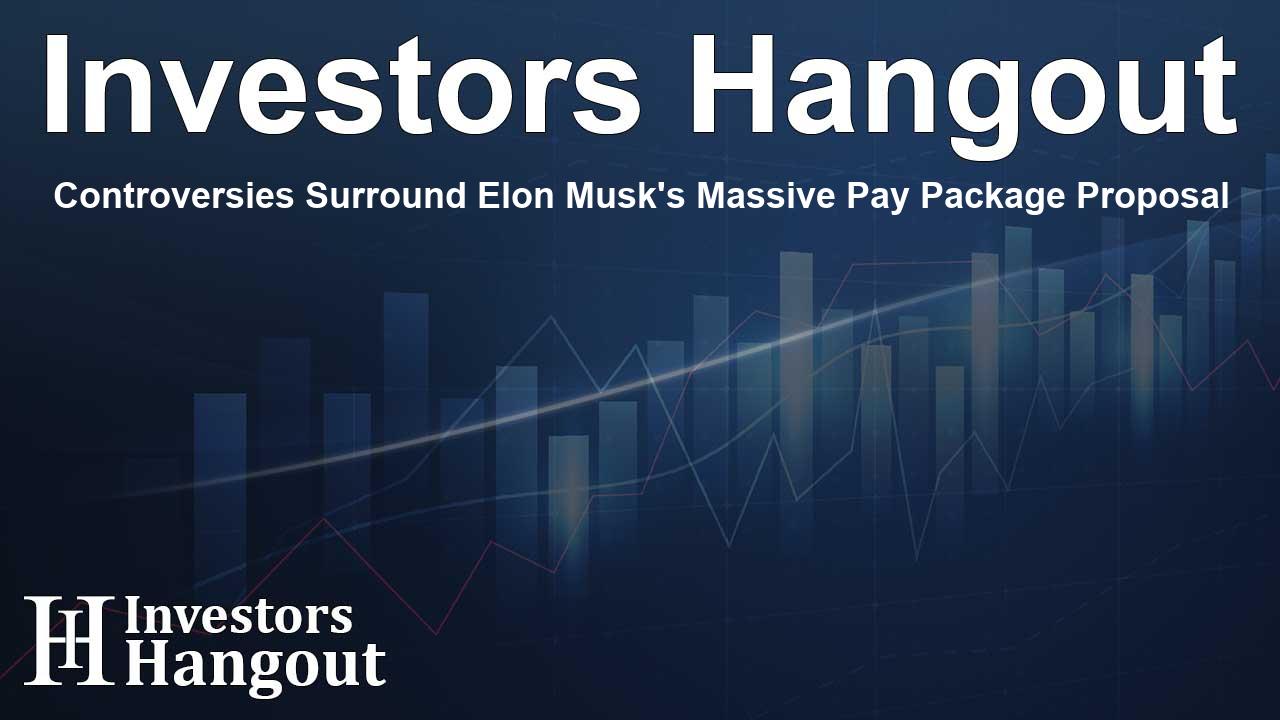Controversies Surround Elon Musk's Massive Pay Package Proposal

Concerns Over Elon Musk's Pay Plan
As Tesla Inc (NASDAQ: TSLA) approaches a pivotal shareholder meeting, the much-debated pay package for CEO Elon Musk has captured the spotlight. On the agenda is a proposal that, should it pass, would configure Musk’s compensation at an astounding potential value of up to $900 billion. Many in the investment community view this as excessive, leading various interest groups to rally against the plan.
What is the New Compensation Structure?
The Scale of Musk's Proposed Earnings
The scheme outlines that Musk must remain with the company for a committed duration of ten years, hitting specific performance milestones to qualify for the total compensation. This structure could catapult Musk into the ranks of history's first trillionaire. To put this in context, it is projected that Musk's annual compensation could approach $100 billion, leaving many to ponder the fairness of such earnings compared to the company's workforce.
Perspective from Tesla Employees
A stark comparison reveals the median annual salary for Tesla employees stands at approximately $57,243. This means that workers earning this amount would need to toil for over 1.7 million years to approximate Musk’s yearly earnings under this plan. Such figures have spurred discussions on equity and fairness within the company.
Shifts in Opinion: The Take Back Tesla Movement
A coalition known as the "Take Back Tesla" initiative has emerged to challenge the narrative surrounding Musk's compensation proposal. This group is comprised of unions and public interest organizations striving to inform shareholder voting decisions. At their core, they stress the vast income disparity between Musk’s potential earnings and those of the average Tesla worker.
The Role of Shareholders
The Take Back Tesla movement aims to mobilize union members and public interest groups to advocate against Musk's pay package. They emphasize that shareholders, particularly those with pension funds, deserve a voice in matters that could impact the company's financial health. The primary goal is to garner widespread dissent against the current proposal.
Understanding the Wider Context
The Implications of Musk's Compensation
Under Musk’s compensation plan, Tesla would need to achieve a market valuation of approximately $8.5 trillion to meet outlined goals. When compared to the current market cap of Nvidia Corporation (NASDAQ: NVDA) at around $4.5 trillion, the monumental expectations set forth have raised eyebrows across the financial community. This plan signals a drastic pay disparity that many find untenable.
Response from Tesla and Musk
In reaction to the backlash, representatives from Tesla have defended Musk’s pay structure. They suggest that his earnings are ultimately tied to the performance of the company, arguing that he will not receive compensation unless the shareholders significantly benefit. Musk himself has labeled critics of the pay structure as "corporate terrorists," further fueling the scrutiny surrounding the decision. He asserts that the pay package is essential for rewarding exceptional performance and ensuring the company's ongoing success.
The Future Outlook for Tesla Shareholders
As the shareholder vote approaches, the possibility of Musk's proposed pay plan being rejected has gained traction. Organizations like the American Federation of Teachers and the Communication Workers of America support the Take Back Tesla movement, representing millions of workers. Their involvement underscores the growing concerns over corporate governance and the potential influence of excessive executive compensation on shareholder value.
Balancing Executive Pay and Employee Equity
The debate surrounding Musk’s compensation reflects broader conversations regarding executive compensation in relation to employee wages. It raises critical questions about the sustainability of such wealth accumulation and its impact on employee morale and retention within the company. The outcome of this vote may not only shape the future of Tesla but also set precedents for corporate pay practices in the industry.
Frequently Asked Questions
What is the total value of Elon Musk's proposed pay package?
The proposed package could be worth up to $900 billion, contingent on performance milestones being met over a ten-year period.
How does Musk's potential salary compare to Tesla employees?
The median annual salary of Tesla employees is approximately $57,243, highlighting the vast discrepancy between employee pay and Musk's potential earnings under this proposal.
Who is backing the opposition to Musk's pay package?
The Take Back Tesla movement includes various organizations like the American Federation of Teachers and the Communication Workers of America, representing millions of workers.
What are the projected market implications of Musk's pay package?
The plan could require Tesla to reach a market valuation of $8.5 trillion, which is more than double Nvidia's current market cap.
How has Tesla responded to the criticism of Musk's compensation plan?
Tesla has defended the pay structure, stating that Musk's earnings align with company performance and asserting he will not be compensated unless shareholders benefit significantly.
About The Author
Contact Ryan Hughes privately here. Or send an email with ATTN: Ryan Hughes as the subject to contact@investorshangout.com.
About Investors Hangout
Investors Hangout is a leading online stock forum for financial discussion and learning, offering a wide range of free tools and resources. It draws in traders of all levels, who exchange market knowledge, investigate trading tactics, and keep an eye on industry developments in real time. Featuring financial articles, stock message boards, quotes, charts, company profiles, and live news updates. Through cooperative learning and a wealth of informational resources, it helps users from novices creating their first portfolios to experts honing their techniques. Join Investors Hangout today: https://investorshangout.com/
The content of this article is based on factual, publicly available information and does not represent legal, financial, or investment advice. Investors Hangout does not offer financial advice, and the author is not a licensed financial advisor. Consult a qualified advisor before making any financial or investment decisions based on this article. This article should not be considered advice to purchase, sell, or hold any securities or other investments. If any of the material provided here is inaccurate, please contact us for corrections.
